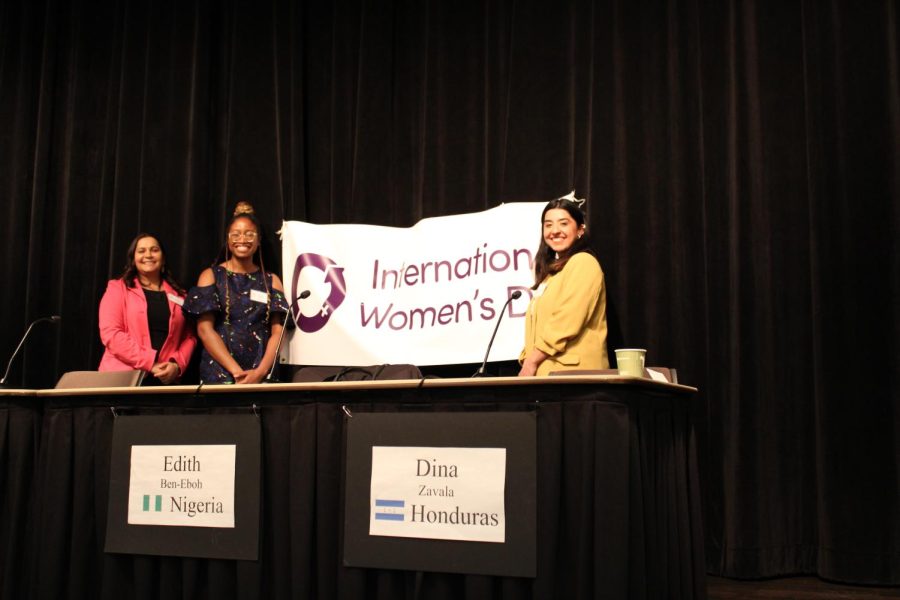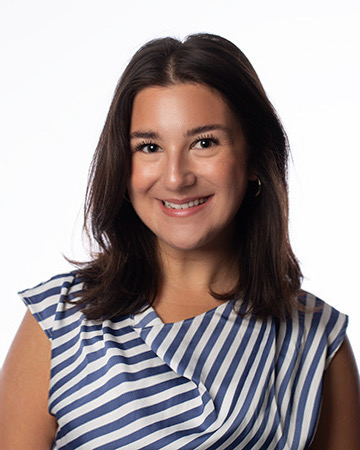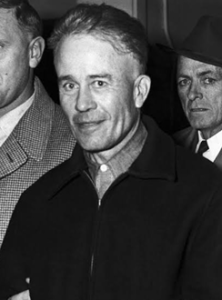UWL hosts panelists from Iraq, Nigeria and Honduras to celebrate International Women’s Day
Panelist from left to right. Dina Zavala, Edith Ben-Eboh and Raghad Al-Khazraji. Photo Taken by Isabel Piarulli
March 10, 2023
To celebrate International Women’s Day on March 8, the University of Wisconsin-La Crosse hosted its 11th annual International Women’s Day (IWD) program. Three panelists from Iraq, Nigeria and Honduras were featured to share their stories and experiences.
International Women’s Day is a global day celebrating the social, economic, cultural and political achievements of women. This year’s theme was ‘Embrace Equity’. With this theme, IWD seeks to get the world talking about why equal opportunities are not enough.
Representing the country of Kosovo, Dr. Lema Kabashi, assistant professor in educational studies at UWL and former IWD panelist, was the moderator for this year’s program.
Kabashi first asked the panelists to tell the audience a little bit about themselves.
The first panelist to answer was the Program Coordinator for Diversity, Equity and Inclusion at Viterbo UniversityRaghad Al-Khazraji from Baghdad, Iraq. “For the first 11 years of my life, my life was completely normal,” said Al-Khazraji. She went to a co-ed elementary school with other girls in her community however, in 2003 when Al-Khazraji was 11 years old this changed.
“She [Al-Khazraji’s mother] said, ‘The country is experiencing war’, I didn’t know what that meant,” said Al-Khazraji. She and her family moved to Syria and then to Jordan, where Al-Khazraji built her life. “I decided to come to the U.S. I wanted to pursue my MBA [Master of Business Administration] and here I am four years later.”
Edith Ben-Eboh is a senior studying public health/community health education at UWL. She grew up in Lagos, Nigeria, where she lived for 17 years before moving to the US in 2019. Ben-Eboh was sent by her parents to attend boarding school at 10 years old. “I went to an only-girls and all-girls boarding school, so I went there for six years, graduated at 16 from secondary school and now I am here.”
Interim Vice Chancellor for Diversity and Inclusion at UWL Dina Zavala was the final panelist to answer. “I grew up in the rural area in Honduras. I actually grew up in the most poor area in the country,” Zavala said. “I am not supposed to be here, I always think about the privilege that I have to have a microphone and be talking to you all.” Zavala explained that the highest level of education she was supposed to receive was sixth grade, but with the help of her parents and community back home, she was given the privilege of education.
When asked what International Women’s Day looks like in her culture, Al-Khazraji of Iraq said, “After the war, women’s rights and their living situations have become so poor that they [women in Iraq] found that international Women’s Day is a day to protest, to rally, rather than a day to sit together and celebrate.” Al-Khazraji said whether it is through performances, speeches, music or holding up signs and protesting, women’s rights organizations and groups use the day to reflect on injustices. “This is the only way, the only day where if they are so loud hopefully the international recognition can hear them and impose some changes.”
Kabashi asked the panelists, “What key issues face women in your country of origin?”
Access to water is what Zavala of Honduras identified as a basic need that does not come easy in her country. “Women are the ones who are fetching water and often younger girls are the ones who are being used…because they have to work to go and fetch water they cannot go to school, they are needed in the home,” said Zavala. “Water costs time and time costs so many opportunities.”
Al-Khazraji said, “Gender-based violence is one of the domain issues in Iraq.” She explained that most of this violence is dismissed and unreported, due to shame culture. “Other things are embedded in the law of the country,” said Al-Khazraji. “So they [women in Iraq] don’t have the legal rights that protects them against those issues.”
Ben-Eboh remembers having to watch her mother cook growing up while her brothers were not expected to. “We are raised to take care of the home; we are raised to have children; we are raised to get married,” said Ben-Eboh. Another societal expectation Ben-Eboh identified was having a male child has a higher regard than having a female child. On the more extreme levels as Ben-Eboh said, “There are some laws that are just discriminatory in and of themselves…there are lesser penalties for assault against women.”
“What has surprised you most about the United States?” Kabashi asked the panelists.
“The freedom of being here is absolutely exhilarating,” said Al-Khazraji. “You become to understand layers of who you are that you have never known before.” Al-Khazraji explained she has come to know who she is more than just being a woman, but as a human being.
“I didn’t realize how independent young people were,” said Ben-Eboh. College students owning their own cars and paying for college was surprising to her. Ben-Eboh is a very involved college student and people often ask her how she has the time to do so many things. “Before I didn’t have a lot of time and now, I have all this time and I can do whatever I want, so I find so many avenues to be active and get involved,” said Ben-Eboh. “It’s actually exhilarating to me.”
Zavala directed her response to this question to both Al-Khazraji and Ben-Eboh. “I have been here for 25 years so when you both were sharing, I know what you are talking about,” said Zavala. “With time that freedom will get bigger.”
This International Women’s Day event was brought to UWL with help from sponsors; AAUW La Crosse, the League of Women Voters of La Crosse, the Women’s Fund of Greater Lacrosse, Viterbo University, and the International Women’s Group.







